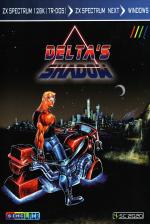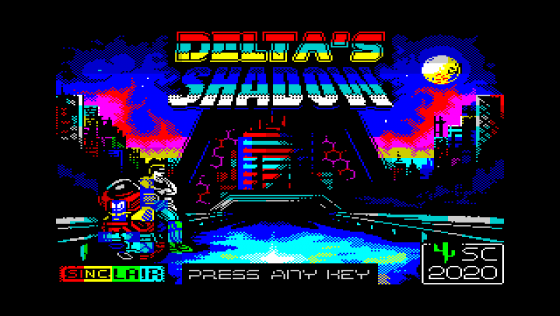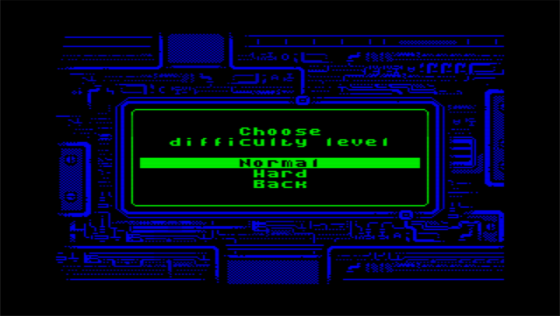
Alessandro Grussu
 9th January 2022
9th January 2022
Categories: Review: Software
Author: Alessandro Grussu
Publisher: SaNchez
Machine: Pentagon 128/Spectrum Next/Windows
Published in Al's Spectrum Annual 2021
Delta's Shadow
Delta's Shadow, the new work of the famous Sanchez group, was released on Christmas Day 2020, after several anticipations throughout that year, and also in the preceding one. It is inspired by the Power Blade series, produced by Taito almost 30 years ago for the Nintendo NES. The setting is not particularly original: in the 22nd century, humanity finally found peace and harmony by entrusting the management of all hard work to a gigantic mainframe called the "Master Computer". One dark day, extra-terrestrial secret agents broke into the Delta Foundation, which took care of the maintenance of the Master Computer, and put it out of action. Nova, the Delta security chief, managed to expose the plot and defeat the invaders.
Years later, the Trigon Corporation takes control of the Master Computer, but Nova and his partner Jacqueline discover that behind it there are the same aliens. It will again be Nova's task to save the Earth from this threat. In every game level, Nova enters one of the Trigon buildings, with the aim of reaching the center and planting a bomb to blow it up. Succeeding in the enterprise is not at all granted, not only due to the presence of many guardian robots of various types - some fly, others crawl, others swim - and dangers such as turrets, conveyor belts and circular blades, but also for the environmental design. Each building is divided into various sections, all very large - we are talking about at least 20 screens per section - and with a maze-like structure, it's not so easy to find your way around.
Delta's Shadow is essentially, like its NES antecedents, a platforms-and-ladders action game, where the player controls Nova and, during an intermission, Jacqueline. Nova can jump, go up and down ladders, swim in parts submerged by water and slide to slip into narrow passages. To defend himself from the hordes of robots trying to stop him, he uses the Power Blade, a sort of boomerang that can be launched in any direction. The Power Blade has a limited charge, which can be restored by collecting appropriate icons; the same goes for Nova's health. Other icons, bearing the symbol of a star, give additional information about the game world, available from the main menu. If Nova loses all its energy, he will start over from the beginning of the current section.
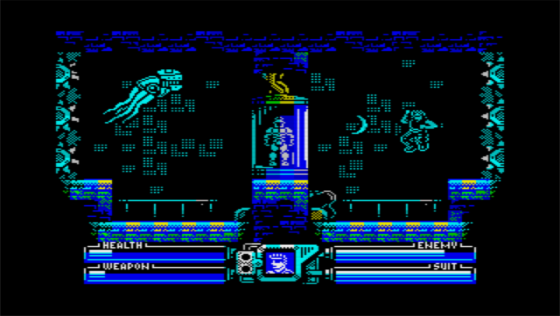
In the depths of the Trigon buildings there are laboratories where suits are kept. These can give Nova special abilities. To get hold of a suit, Nova must defeat the robot boss guarding it. The first suit enables Nova to climb walls, the second to move easily in the water, and so on. Suits are also equipped with a powerful energy weapon. Like the Power Blade, suits are activated by a charge that runs out with use and must be restored by collecting icons with the symbol of a battery.
Jacqueline, as previously mentioned, comes into play in the middle of the game. She must hack a number of terminals at Trigon's headquarters. To combat the guards patrolling the place, she has a stun gun and an invisibility device at her disposal. Hacking the terminals also has the effect of activating elevators to access the various parts of the building, up to the terrace on the ninth floor, where a helicopter arrives to take her away.
There are two difficulty levels, Easy and Hard. The second differs from the first for the presence of a driving sub-game, where you control Nova speeding on a sort of magnetic levitation motorcycle: in fact, to reach each Trigon building, he must run through a path full of obstacles. This is the weakest part of the game, as it comes down to a simple memory exercise about the arrangement of obstacles, and since you cannot slow down or speed up the bike, you just have to try to dodge them as quickly as possible, which can become frustrating. Also, while on Easy Nova starts each section with maximum health; on Hard he will start with the amount of health left at the end of the previous section, and if that amount is small, it is easy to understand that proceeding in the mission will be quite arduous.
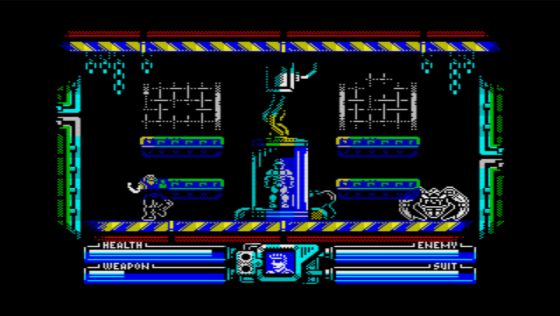
Has the long wait for Delta's Shadow been rewarded? Let's say right away that we are experiencing an extraordinary title, a real blockbuster. The game is a real joy for both eyes and ears: graphics, animations and sound are truly first class, and above all varied. Nova moves convincingly, and the enemy robots' sprites are no exception. There are no "recycled" scenarios, but each section has a distinct appearance, different from the others. There are about twenty audio tracks and they make the game action more atmospheric.
Furthermore, Delta's Shadow is vast and requires dedication. As seen before, sections are large and not very linear. It takes time to master Nova's actions and learn how to strategically exploit the suits' special abilities. Underwater, movements are slowed down and if you are not careful, you risk crashing into enemies or circular blades. There are also secret areas, revealed by firing at certain walls, where useful icons are hidden. The part where you play as Jacqueline is a pleasant diversion that "breaks up" the narrative flow and adds further depth.
Of course, this means that Delta's Shadow cannot entirely fit in the RAM of a single Spectrum. It is distributed on a 640 KB TR-DOS disk image, in order to store all the necessary data, which are loaded when needed. On a real Spectrum, the game can only be loaded from a DivIDE interface and derivates equipped with the ESXDOS operating system. The presence of so many graphic details, then, is the reason for differentiating the detail level into low, medium and high: only the first mode is default for an "ordinary" Spectrum, while by running Delta's Shadow through an emulator capable of increasing the processor frequency (for example SpecEmu), you can enable the extra details.

These consist of some background animations, like spinning fans, and pieces of robots or debris that detach on impact from the Power Blade. In any case, these are all side aspects, which compromise neither the overall impression, nor the playability.
The less convincing aspects are the driving part and the presence of two separate controls for climbing ladders and jumping, something that always bothered me. I would have rather liked to be able to assign the same key to the Up and Jump controls. Are they serious flaws? Certainly not; the perfect game does not exist, after all.
That said, Delta's Shadow is a simply unmissable title, combining a truly professional technical realization with an intense and lasting involvement for the player. It is worth much more than the five Euro minimum price for the digital download, and what's more, you also receive the equally excellent version for the Next and one for Windows, which combines the Spectrum and Next versions together. As a consequence, Delta's Shadow fully deserves my personal Game Of The Year 2020 award.

